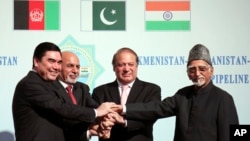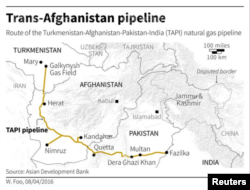Afghanistan will host leaders from Turkmenistan, Pakistan and India on Friday for the ground-breaking ceremony of the Afghan section of a much-delayed multi-billion dollar gas pipeline connecting the four nations.
The $10 billion mega project, known as Turkmenistan-Pakistan-Afghanistan-India, or TAPI, will connect Central Asia with South Asia and is expected to become operational this year.
The 1,814-kilometer pipeline will carry an estimated 33 billion cubic meters of natural gas annually for the next 30 years from the world's fourth-largest reserves in Turkmenistan.
Officials say India and Pakistan would buy around 14 billion cubic meters each, while the remaining five billion would go to Afghanistan.
Friday’s inaugural ceremony will take place in the western Afghan city of Herat where President Ashraf Ghani, his Turkmen counterpart, Gurbanguly Berdymukhammedov, Pakistani Prime Minister Shahid Khaqan Abbasi and India’s Minister of State for External Affairs MJ Akbar will be in attendance.
Turkmenistan launched construction of its section of the pipeline in December 2015.
Pakistan's relations with Afghanistan and India have since deteriorated over allegations Islamabad is not doing enough to stop terrorist groups from using its soil for attacks against the neighboring countries.Pakistani officials deny the charges.
But despite the tensions, energy-deficient India is showing renewed interest in TAPI and pushing for its operationalization, according to Indian media reports.
"Today, given the energy requirements in India, there are several gas pipeline proposals before us. We are, however, strongly committed to TAPI pipeline project," Akbar was quoted as saying.
The project is more than the sum of four nations’ interests and creates a benchmark for regional cooperation, he added during an implementation committee meeting in Turkmenistan.
Economic milestone
The Afghan government and business community also see the pipeline as a milestone in the war-shattered country's economic development. Kabul is expected to earn up to $500 million annually in transit duties and the project will help create as many as 25,000 jobs, local media quoted Afghan analysts.
The pipeline mostly runs through parts of southwestern Afghanistan where the Taliban insurgency controls or influences many districts. But a spokesman for the insurgent group, Zabihullah Mujahid, says it supports the project and will ensure the pipeline's protection.
Herat Governor Mohammad Asif Rahimi told VOA the Afghan and Turkmen presidents will additionally inaugurate work on the construction of a railway link between the two countries, as well as fiber optic connection along the TAPI route.





